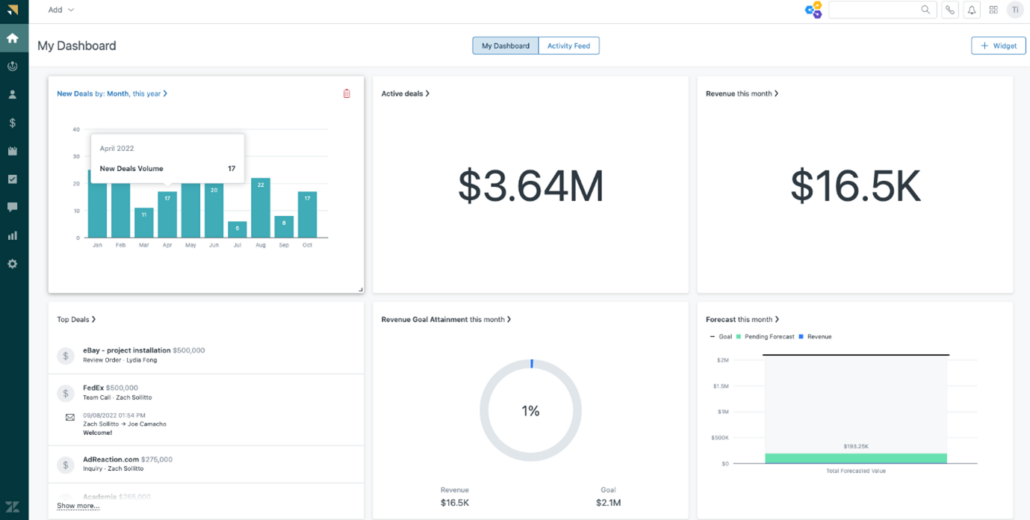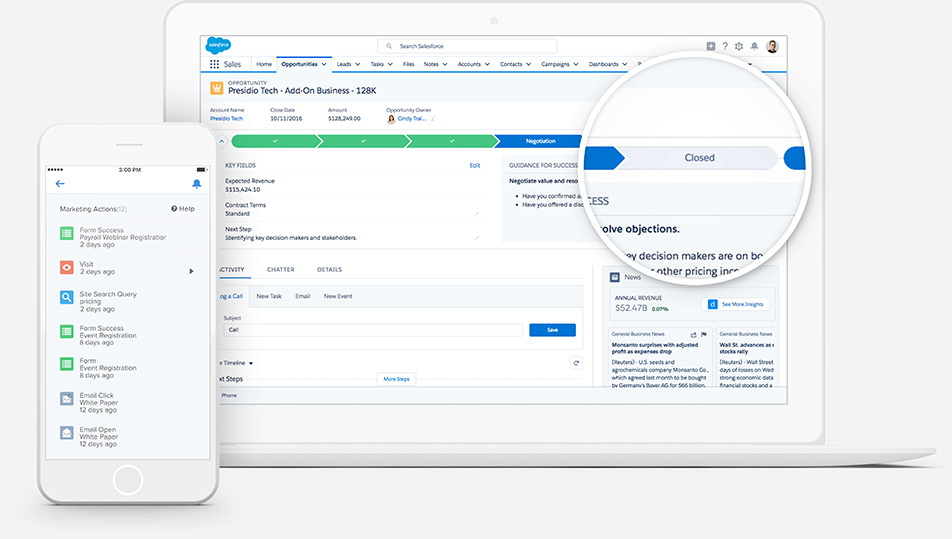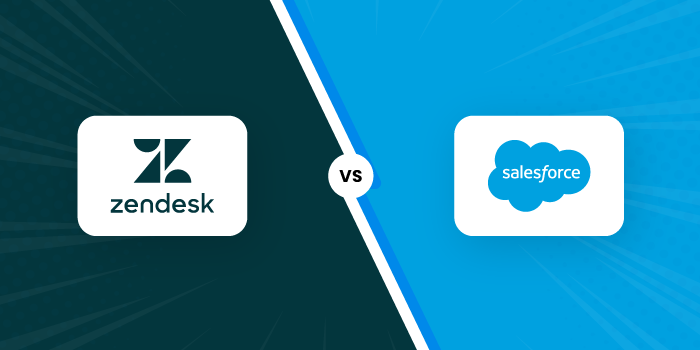Zendesk and Salesforce are two of the biggest CRM players today that help B2B and B2C businesses. Although the former is well-known for its ticketing service, it provides a clean and user-friendly CRM that integrates with its customer service platform like a glove. On the other hand, Salesforce, is a tailor-made and highly customizable CRM with many in-depth features.
While Zendesk and Salesforce are both great, the tool that wins the Zendesk vs Salesforce battle should also be the right fit for your business.
This is what this blog is here for. Let’s begin by understanding more about the two CRMs.
What is Zendesk Sell?
Zendesk Sell is a sales CRM built to simplify lead management, client interactions, workflows, and manual tasks for businesses. First released in 2018, this CRM is mainly used by US-based companies, such as, Polaris, Staples, and Vimeo. A couple of years and 0.66% of the market share later, Zendesk Sell provides excellent sales automation, lead management, and sales force automation, which has led to many businesses siding with this company.

Is Zendesk Sell the right fit for your business?
Zendesk Sell is best suited for SMBs and enterprise businesses that want easy-to-use features and a faster implementation time.
Furthermore, Zendesk Sell seamlessly integrates with Zendesk Service—a great plus for companies whose bread and butter rely on ticketing systems. Therefore, it’s a good fit for sectors like customer service, retail industries, and product testing.
Why do companies look for Zendesk Sell alternatives?
Just like Zendesk Sell, every CRM has its strengths and weaknesses. Here are a few reasons why companies seek Zendesk Sell alternatives:
- Expensive: Even though Zendesk Sell is relatively more affordable than Salesforce, its higher packages still cost a lot more than other CRM’s. The price point doesn’t suit small businesses.
- Limited lower package features: Let’s stay on pricing for a bit longer. Zendesk Sell provides vital features, like customizable reports, only at higher-priced packages. Furthermore, it also caps the number of customizable pipelines your team can build in each package.
- Integration difficulties: Several customers on G2 have reported how Zendesk Sell’s basic package only allows a handful of integrations. Also, they lack APIs to integrate with crucial marketing applications like MailChimp, which companies found disadvantageous.
- Not-so-great customer support: Another common review shared by users mentions that getting a hold of customer support is tough, and when they do respond, they are not very helpful.
Now that you know where Zendesk Sell stands in the Zendesk vs Salesforce debate, let’s look at Salesforce next.
What is Salesforce Sales Cloud?
Salesforce needs no introduction. One of the oldest and most prominent CRMs in the business, Salesforce provides enterprise-level companies with highly customizable solutions. They’re known for their robust and dependable features like workflow automation, integrations with every app in the market, lead management, and sales automation.

Which kind of businesses should choose Salesforce?
Salesforce doesn’t have ready-to-deploy modules; they tailor it according to each business’s needs. Therefore, it suits companies with unique business processes who want extensive customizability and features.
Furthermore, Salesforce is best suited for enterprise-sized companies that have big budgets to invest in CRMs. This is because some essential features that are required by every business are locked away at more expensive packages.
Then, why do companies look for Salesforce alternatives?
Now while this CRM might look like the one to go for, there are a few shortcomings that cause buyers to explore Salesforce alternatives, like:
- Expensive Pricing – While Salesforce does have a basic package called ‘Salesforce Essentials’ at just $25 per user/month, it lacks important features like customized reporting, workflow automation, and pipeline management. This forces companies to opt for packages at higher prices, which aren’t affordable.
- Difficult to use – Another thing to watch out before investing in Salesforce that the platform is not intuitive or easy to use. As a customer put it on G2, “There is a lot that Salesforce can do, and it can be a little overwhelming sometimes.“
- Long implementation time – As mentioned above, Salesforce does not have ready-to-deploy models and instead tailors them to your company’s needs. This leads to a longer implementation time. Depending on how much customizability your company needs, it can take 3 to 12 months to get your Salesforce CRM up and running.
- Additional customization charges – And if the package prices weren’t high enough, Salesforce charges between $20 and $120 per hour to modify your existing software, making it even more expensive.
One important thing to note is that when we mean cons or shortcomings, they don’t imply that the CRM is bad, just that if you are looking for those features or requirements, then they might be able to satisfy your needs.
We hope that these shortcomings help you understand what to expect from the CRMs.
Now that that is out of the way before we can look at the comparison table, we have another alternative solution for you – LeadSquared, an end-to-end sales execution CRM.
What is LeadSquared?
LeadSquared, India’s first Unicorn to have no VC funding, is a sales execution CRM built to break the traditional norm of inflexible software. It provides tailor-made solutions to businesses that want lead management, workflow automation, sales automation, and out-of-the-box integrations, to name a few.
Why is LeadSquared an alternative to Zendesk and Salesforce?
The big question that will be on your mind is – Why LeadSquared, and why not any other CRM?
First, this CRM is an excellent fit for businesses of all sizes. It caters to SMBs and many enterprise businesses like BYJU’s, Manipal Hospital, and Poonawala Fincorp.
And despite being feature-extensive, LeadSquared is simple to use. Even newcomers can easily pick the CRM up. Its affordable pricing, no-code drag-and-drop style UI, and excellent customer support are some things that make it a great choice for businesses.
One mild inconvenience with the CRM is that sometimes it can be slow. However, since the company is known for great customer support, you can expect this issue to be resolved soon.
Now that we have discussed all the CRMs, here is a comparison chart that compares the three CRMs based on different aspects.
[Don’t forget to download it for free and share it with your colleagues – Zendesk vs Salesforce Comparison Chart]
Zendesk vs Salesforce Comparison Table
Zendesk Sell | Salesforce Sales Cloud | LeadSquared Sales Execution CRM | |
Pricing |
|
|
|
Free trial availability | 90 to 185 daysYes. There is a 14-day free trial. | Yes. There is a 30-day free trial | Yes. You can get a free trial upon request. |
Implementation time | 90 to 185 days | 35 to 335 days | 5 to 15 days |
Best Features |
|
|
|
Available on: | |||
Devices | Mobile, tablet, and desktop | Mobile, tablet, and desktop | Mobile, tablet, and desktop |
Mobile OS | Android and iOS. | Android and iOS. | Android and iOS. |
Search Engines | All search engines | All search engines | All search engines |
Languages supported | Over 31 languages, including Polish, Hebrew, and Turkish. | Over 16 languages, including Thai, Chinese, and Japanese. | Over 7 languages, including Spanish, Hindi, and Brazilian. |
Customizations | Only customizable at higher tiers. You can customize the following:
| Salesforce is highly customizable, with solutions built from scratch to suit your business needs | LeadSquared is a highly customizable platform. You can customize -
|
Scalability | Zendesk Sell offers features essential to scale up only at higher packages. This can make scalability an issue, especially for SMBs. | Salesforce is not very scalable for small businesses due to its high pricing. | LeadSquared provides all essential features for scaling up at basic packages. It also integrates with more than 300 applications and provides robust solutions, even for big teams. |
Customer support | All packages include the following: · Help portal · Self-service resources · Training and onboarding · Phone support · Email support | Standard package includes: · Help portal · Self-service resources Premium packages additionally include: · Expert coaching sessions · 24/7 support | All packages include the following: · Self-service resources · Help portal · Onboarding and training · Email support · Phone support |
User Feedback: | |||
Positives: | |||
Negatives: | Occasionally slow to use | ||
Now, if you feel like neither CRMs here fit your business and want to reconsider options, then here are a few tips to remember. All these points have been taken from out CRM Buyer’s Guide, so be sure to check them out!
Tips to find your ideal CRM
1. Check their reviews
And we cannot stress this point enough. Reviews are crucial to validate a CRM’s credibility and how well they are performing. Instead of reading just the latest reviews, be sure to read reviews from the past as well. This will give you an idea of whether the company pays attention to its customers, is aware of their shortcomings, and has made improvements to fix their past issues.
Another thing to be aware of is looking at only trusted review sites. Some of them are:
- TechnologyAdvice
- Capterra
- Gartner Peer Reviews
- G2
2. How good is their customer service?
Nobody likes slow customer service, or worse, unhelpful support. But why are we stressing on customer support so much? Well, it’s because that if anything goes wrong, they are the ones who are going to help you fix it. And slow or unhelpful responses can hinder converting all those prospects in your funnel.
You can test how good a customer service is by looking at how long it takes for your queries to be resolved. Call them up or reach out to them on email and note down whether they get back to you within a time frame. If they exceed it, then you probably want to reconsider choosing that company.
3. Integrations
Last, but not the least, we have integrations. Your CRM should seamlessly link between itself and third-party applications. Why are they so important? It’s because integrating everything together ensures zero lead leakage and saves time on having to copy data from one system to the other.
Some integrations that a CRM must have are:
- Lead source and lead capturing integrations
- CMS (WordPress)
- Telephony and Email integrations
- Lead gen industry-specific websites
- Google ads
- Marketing automation tools
Look for both generic as well as company-specific integrations when buying a CRM. For example, if you already use a telephony provider, then your CRM should be able to integrate with it seamlessly and easily.
While these things are super important to consider while looking at CRMs, if you want to know what some red flags in a CRM are that you should absolutely steer clear from, then be sure to check out our e-Book.
Now, one of the most difficult things to find in a CRM is a balance between scalability, customizability, and affordability. That’s where LeadSquared distinguishes itself from other CRMs. With a harmony between price, customizations, and integrations to help businesses scale up, LeadSquared is a great fit for businesses of any size and any level. Interested to know more? Get in touch with our experts today!
FAQs
While Zendesk has a fast implementation time and is easier to use, Salesforce offers better customer service and more customizability.
Yes, Salesforce can integrate with both Zoho and Zendesk for their ticketing systems.
Zoho is an ideal alternative for Zendesk when it comes to ticketing services. However, when it comes to CRMs, Salesforce is a better alternative to Zendesk.









